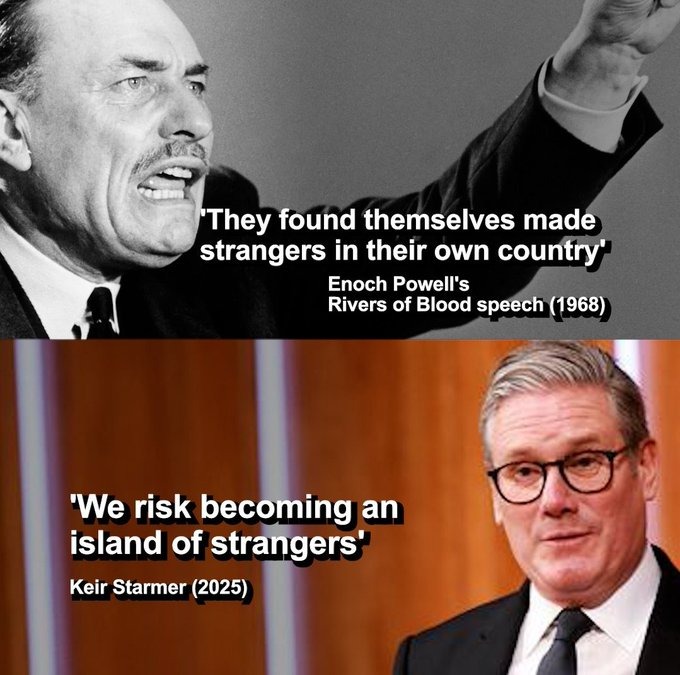When we talk about radicalisation in the UK, certain names come to the fore, Anjem Choudary being one of the most notorious. For years, he played a pivotal role in preaching a hard-line, politicised interpretation of Islam, pushing vulnerable minds towards extremist ideologies. Most public conversations rightfully focus on the impact he had on young Muslims who were drawn into his orbit, some of whom later travelled to Syria or committed acts of terror at home. However, what often gets overlooked is the collateral damage: the people outside of the Muslim community who were affected by the echo of his words, the radicalised ideology he spread, and the wider societal ripple effects. That includes people like me a non Muslim.
It’s easy to frame radicalisation solely in terms of what it does to Muslim youth. That narrative is clear-cut, and the dangers are visible. But the deeper, more insidious legacy of someone like Anjem Choudary is how his ideology, and the widespread attention it received, began to shape how people outside those communities perceived Islam. Worse still, it altered how some of us engaged with it, turning curiosity into obsession, understanding into distortion.
For people like myself, Choudary’s interpretation of Islam became the gateway. We didn’t grow up Muslim. We didn’t learn the faith through family or community. Instead, we encountered it through headlines, documentaries, and online forums. And often, the figure standing centre stage was Choudary, preaching a warped version of Islam, heavy with political grievance, historical revisionism, and calls to a confrontational form of jihad. He became the lens through which we viewed the religion. And that lens was cracked, dark, and ultimately dangerous.
It’s a strange thing to admit: being radicalised by watching someone you inherently oppose. But that’s exactly what happened to many. Watching Anjem Choudary wasn’t just a passive experience. For some of us, it sparked a deep, often obsessive, need to understand “what makes these people tick.” We read the same sources, studied the same texts, dived into theological and political history. We learned his talking points, watched his debates, and began to shape our worldview in opposition to him. But in doing so, we unknowingly adopted many of the same premises.
It was a form of radicalisation by proxy. His black-and-white worldview infected ours. The idea that Islam was fundamentally political, that it sought to dominate, that Muslims could not coexist peacefully in secular society, these weren’t just Choudary’s claims. They became our assumptions. In a twisted irony, we mirrored his rhetoric while claiming to fight against it.
What made Choudary so dangerous wasn’t just the content of his message, it was the framing. He didn’t preach Islam as a spiritual faith but as a total political system. Every verse had a law, every hadith a policy prescription. There was no separation of mosque and state, no room for plurality or cultural nuance. It was Islam stripped of mysticism, stripped of diversity, stripped of humanity. What remained was a rigid, aggressive ideology rooted in conquest and division.
And this was the version that gained traction in media coverage, internet forums, and among people like me. For years, when we thought of Islam, we didn’t think of prayer, compassion, or community. We thought of ideology. We thought of political manifestos masquerading as scripture. We thought of Choudary.
That mindset does lasting damage. It shuts down the ability to truly understand the religion on its own terms. It breeds mistrust, fuels hate, and polarises communities. It pushes people to see Muslims not as neighbours or fellow citizens, but as foot soldiers in some imagined war. And it gives rise to reactionary movements, conspiracy theories, and deep social divides.
Choudary may not have wielded weapons, but he armed minds and not just within his intended audience. He radicalised two generations of Muslims, yes. But he also played a role in radicalising generations of non-Muslims, including angry white men with no faith background, who absorbed his message and responded with fear, hostility, and sometimes violence. His rhetoric didn’t just stay within the walls of mosques or on obscure Islamic websites. It bled into the wider culture, shaping how entire communities saw each other.
This is the part that rarely gets discussed. We talk about “Islamophobia” or far-right extremism as if they sprang from nowhere. But for many of us, our journey into suspicion, hostility, or counter-radical ideologies began with watching people like Choudary. He was the first introduction to Islam for many, and what an introduction it was: provocative, angry, divisive. His aim was to create conflict, and in that, he succeeded beyond measure.
In the years since Choudary’s peak influence, the UK has done much to curb the spread of radical content. He has been imprisoned, his network dismantled, and his followers monitored. But the damage is already done. The ideological seeds he planted have taken root, not just in Muslim minds but across entire segments of British society.
For those of us who followed his every word out of morbid curiosity or a desire to understand the threat, we now have to confront what we became. We have to acknowledge that we too were drawn into his world—not as followers, but as unwilling participants in a culture war he helped ignite. And we have to ask: what now?
Moving forward means rejecting the simplistic binaries that Choudary and others thrived on. It means recognising that Islam is not a monolith, and that the loudest voices are not the most authentic. It means seeking out real Muslim voices, spiritual, intellectual, cultural, and listening with humility. It also means understanding our own radicalisation, however indirect or unintended it may have been.
The fight against extremism isn’t just about deradicalising Muslims. It’s about deradicalising society. It’s about healing the fractures created by men like Anjem Choudary. And that healing starts with honesty, about what we believed, why we believed it, and how we can unlearn it.
Because the truth is, many of us are victims too. Not in the traditional sense, not in ways that warrant sympathy or headlines. But victims nonetheless—of a narrative war we didn’t know we were part of. A war that left us suspicious, angry, and far from the truth,
Let’s not forget the full scope of the damage. Let’s not forget the silent victims. Let’s not forget ourselves.
@Newdaystarts
Anjem Choudary, the leader of the banned group al-Muhajiroun, has been jailed for life and may never leave prison alive.
Anjem Choudary: Radical preacher jailed for life – BBC News











